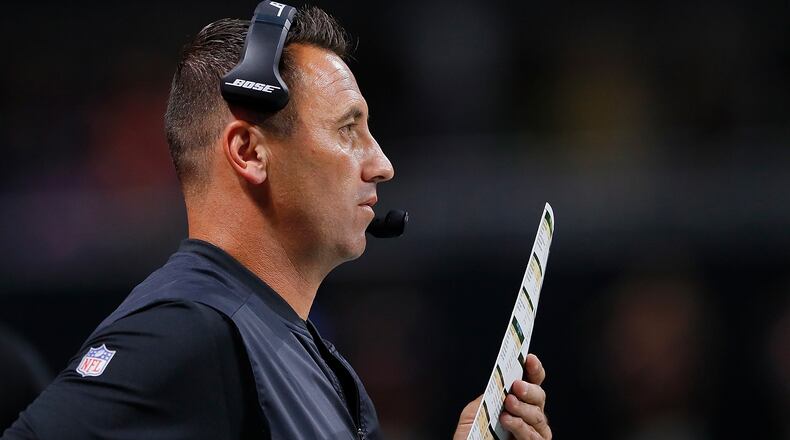While much of the Falcons’ roster scattered to visit family during this bye week, coach Dan Quinn spent a few days with his staff “self-scouting” his team, and he didn’t wait until diving into videotape to give passing grade to his first-year coordinators.
With Steve Sarkisian calling plays on offense and Marquand Manuel making calls on defense, the Falcons are 3-1 through the first quarter of the season with few blemishes to lock onto and critique. They do have a few hiccups to cure.
“I’ve been impressed by both their ability to communicate to the players and their in-game strategy,” Quinn said Monday before most players left town.
After a choppy win at Chicago where they hung on in the final seconds with defense, a solid win over Green Bay when the Falcons dominated the first half and sort of fiddled in the second, and another hold-on victory at Detroit there came a 23-17 loss Sunday to Buffalo in which turnovers finally sank the Falcons.
Sure, the Falcons’ last two plays on offense Sunday -- a pair of failed passes on third-and-1 and fourth-and-1 from the Buffalo 10-yard line -- came under question.
Yet metrics suggest that the Falcons are better on defense this season, and just a tick or two – or a few picks – behind their record-setting offensive pace of 2016.
On defense, the Falcons rank No. 13 in the NFL in yards allowed per game (318.3), ninth in yards per play (4.97) and seventh in passing yards per pass play (5.4) -- a sterling number, especially in a pass-happy league.
In many ways, the Falcons’ defense is ahead of last season’s paces, particularly with the pass rush. The Falcons have 12 sacks, which projects to 48. Last season, they had 34, even as Vic Beasley led the NFL with 15.5.
The Falcons rank No. 8 in the NFL in creating pressure on dropbacks, harassing the quarterback 36.6 percent of the time.
This has been a committee project; eight players already have at least one sack, and Beasley missed the past two-plus games with a hamstring tear.
Manuel, 38, had never been a coordinator before, but was on the same staff as Quinn for five years, four on defense, in Atlanta and Seattle, where Quinn was defensive coordinator as the Seahawks played in two Super Bowls.
“I was right next to him a lot of the time when he was calling the defense, and in that whole process (I was) understanding what was good, what was bad, how to move around it, how to adjust,” Manuel said not long ago. “That is really the name of the game.”
As one might suspect, the head coach is closely connected to Manuel on game day. Unlike the back half of last season, however, Quinn is not making the calls as he did upon taking the defensive reins from former coordinator Richard Smith.
“Just from my background, I’ll always have the connection because of my involvement with the defense,” Quinn said. “Man, I’ve been impressed by him in game. He’s really clear-headed. The calls are in quickly, and here’s why I called it.
“Sometimes we’ll talk in between a series, and he’s able to have good recall on what happened and here’s what I’d like to do based on that. I’ve been impressed by that so far. I’ve liked the versatility of using different guys in different roles and how to match up on certain players.”
Sarkisian is more independent, and it may be fair to say that he spends more time on game days in counsel with Ryan than with Quinn.
The former college coordinator and head coach has worked hard to connect with his quarterback.
“I think just, one, being open in our communication, and two, being a little bit flexible each way, having a little bit of give each way,” Sarkisian said early in the season. “I think both of us recognize the importance of this relationship.”
The Falcons’ offensive play sheet is not much different than it was last season with current 49ers coach Kyle Shanahan calling plays.
Perhaps Sark calls more rub routes than his predecessor, and maybe the Falcons are running more formations with three receivers to one side, but it may be too early to say these are trends.
Sarkisian might not be calling as many deep shots as Shanahan, but perhaps that’s because Ryan hasn’t been connecting on many. Through four games, he’s 3-of-15 on passes that traveled 20 or more yards downfield, according to Pro Football Focus.
“For sure we want to improve on our chances when we can take some shots down the field,” Quinn said. “Sometimes that comes with a little more time .. .”
Ryan threw seven interceptions in all of his MVP season of 2016. He’s thrown five so far, although it should be noted that three went off his receivers’ hands.
It didn’t help the Falcons that starting wide receivers Julio Jones and Mohamed Sanu missed the second half of the Bills game with injuries, yet running backs Devonta Freeman and Tevin Coleman remain the NFL’s most potent backfield tandem.
They’re on pace for a combined 2,756 yards from scrimmage and 24 combined touchdowns.
“The part that I like is the ability to utilize guys in different ways,” Quinn said. “I’ve loved seeing the packages where we’ve featured both Devonta Freeman and Tevin Coleman together, creating opportunities for guys in space to make plays.”
On offense, the Falcons rank No. 4 in yards per game (388.3), they’re tied for No. 3 in yards per play (6.21), No. 4 in yards per running play (4.7) and No. 4 in yards per passing attempt (7.3).
Their greatest problem has come in the red zone, where a 57.14 percent scoring rate ranks tied for No. 15.
You can bet a lot of this week’s self-scouting zeroed in on that.
Given that the Falcons have a new right guard in Wes Schweitzer and that Ty Sambrailo has had to replace right tackle Ryan Schraeder (concussion) for the past two-plus games, it ought to be hard to complain overall.
But if you must, the Falcons rank No. 28, or fifth-worst in the NFL, with a 3.7 percent interception rate and No. 28 in defensive interception rate (0.65 percent). Cornerback Desmond Trufant has the team’s only pick – in four games.
Quinn believes both those numbers can and will be corrected.
About the Author
The Latest
Featured


